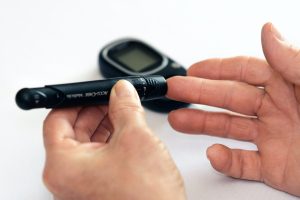“Take, for example, diabetes – when you don’t exercise, your insulin resistance gets worse. So, your blood sugar rises. It’s a vicious cycle.”
The body breaks down food and turns it into glucose, which is released into the bloodstream. The sugar level in the blood goes up, which triggers the pancreas to release insulin. Insulin helps the glucose get into the cells, where it becomes energy.
Diabetes occurs when the body cannot make enough insulin or isn’t able to use it properly, leaving too much sugar in the bloodstream.
High blood sugar can damage a number of tissues and bodily functions, including circulation to your legs and feet. “The good news is, there are steps you can take to help reduce the risks that come with living with diabetes,” said Dr. Diana Perry of CiC Foot & Ankle. “It’s all about being proactive, and exercise is one of those actions that can make a difference.”
But, there are obstacles to exercising when you have diabetes. “It’s so important to move your body. But, I know if your feet hurt, you can’t walk, it just makes things worse,” said Perry. CIC Chief Medical Officer Dr. Joel Rainwater, who treats poor circulation in the legs, agreed. “Exercise is fundamental to overall health. Walking is a wonderful tool for cardiovascular fitness, but you can’t walk if you don’t have good circulation.”
“The human body is the only machine that breaks down when you don’t use it. Many people with PAD cannot tolerate any type of exercise. This causes their other conditions to get worse,” explained Rainwater. “Take, for example, diabetes – when you don’t exercise, your insulin resistance gets worse. So, your blood sugar rises. It’s a vicious cycle.”
“High blood sugar and inflammation related to diabetes attacks your blood vessels and causes them to block with plaque. Fortunately, that is something that we can fix,” said Rainwater. “We can now treat patients with blocked arteries, get them back on their feet, get them back to their lives with almost no downtime, no stitches, no overnight hospital stays.”
Foot pain is also treatable. The first step to keeping your feet in good shape is to pay attention. “I view pain as a gift,” said Perry. “It’s your body’s way of telling you something is wrong. Heel pain, bunions, hammertoes, burning, tingling and cramping are among the many complaints that keep people from their activities.”
These conditions respond well with proper care. “When dealing with any foot pain, I look for what’s causing the problem, so we can treat it, instead of just treating the symptoms,” explained Perry. Over the years, treatments have advanced, and surgery is not always the best or first option.
The key is to keep in mind that everything in the body is connected. Seeing a doctor about cramping in your legs and feet, and toe, arch or heel pain that keeps you from walking can help get you on the right track. Treating these issues sooner than later makes a difference. FBN
By Reisha Zang
Dr. Joel Rainwater, M.D., is an interventional radiologist who uses imaging technology and techniques to care for medical conditions that affect the nearly every organ system in the body. These conditions include peripheral artery disease, enlarged prostates, liver cancer, and peripheral vascular disease. He can be reached at Comprehensive Integrated Care: 928-719-7400.
Dr. Diana Perry, DPM, is a podiatrist who treats a wide range of foot problem. She specializes in limb preservation and trauma of the foot. She can be reached at CiC: 928-719-7400.
Reisha Zang is director of communication at CiC. You may contact her at 928-719-7400 or reisha.zang@ciccenters.com.





